Radiation Safety
To make an accurate diagnosis of your condition, an imaging study using radiation (X-rays) or radioactive materials may be necessary. Most exams carry a very low risk from radiation, and the benefit of having the procedure outweighs the very small risks associated with radiation exposure.
Imaging professionals at Boone Hospital Center are committed to providing high-quality imaging at the lowest possible radiation dose to the patient. Whether you are having an X-ray procedure or a procedure where you are administered radioactive materials, you can rest assured that your safety is our priority.
Here are some reasons why you should “Choose Boone” for your imaging procedure:
Appropriate Exams
Eliminating unnecessary radiation exposure begins with the proper selection of an imaging study for the specific needs of every individual patient. Sometimes, the most appropriate imaging test does not involve radiation exposure, such as an MRI or Ultrasound. Our Radiologists are available 24 hours a day, seven days a week to consult with referring doctors regarding the safest and most effective test to order for a specific clinical condition.
Nationally Accredited Imaging Departments
Boone Hospital Center is fully accredited by the American College of Radiology (ACR) in CT, Nuclear Medicine, PET, Ultrasound, Breast Ultrasound, Breast MRI, Stereotactic Breast Biopsy and Mammography. The ACR Gold Seal of Accreditation signifies that our facility’s personnel qualifications, equipment standards and image quality have gone through a rigorous review process- and have met or exceeded quality assurance and safety guidelines.
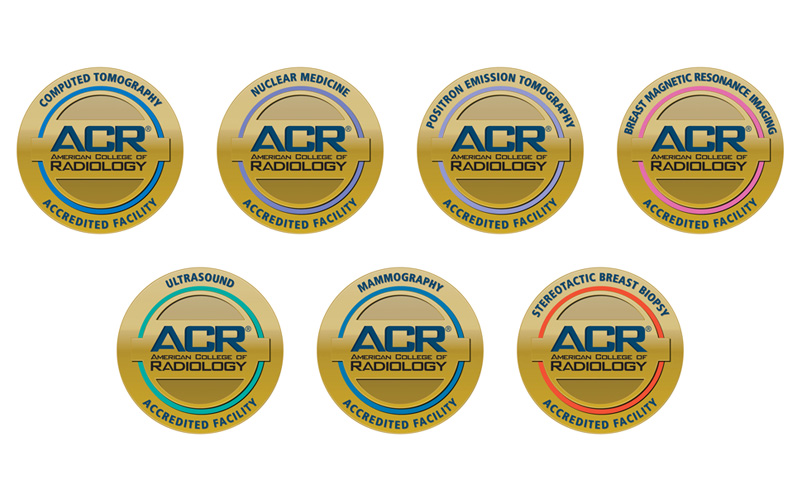
Comprehensive Radiation Safety Program
Boone Hospital Centers’ approach to radiation safety is proactive. We maintain a comprehensive radiation safety program that is committed to the safe use of medical radiation for our patients and employees. The BHC Radiation Safety Committee oversees the radiation safety program and meets regularly to ensure compliance with state and federal radiation safety regulations.
Boone Hospital Center has pledged to abide by the initiatives of the Image Wisely™ campaign. This national campaigns represent a collaborative of several professional societies (American College of Radiology, American Association of Physicists in Medicine, the American Society of Radiologic Technologists, and the Society of Nuclear Medicine) with the objective of lowering the amount of radiation used in medically necessary imaging studies and eliminating unnecessary procedures.
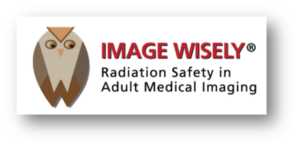
State-of-the-Art Equipment
Boone Hospital Center is committed to being leaders in dose reduction technology. We perform diagnostic and interventional procedures using the most ‘state-of-the-art’ equipment available. Our CT scanners have built in safety features and dose reduction software* that significantly reduce radiation dose in comparison to other systems available on the CT market. The ability of our CT scanners to automatically adapt radiation exposure to the patient’s size allows us to provide physicians with the highest quality images using the lowest radiation exposure.
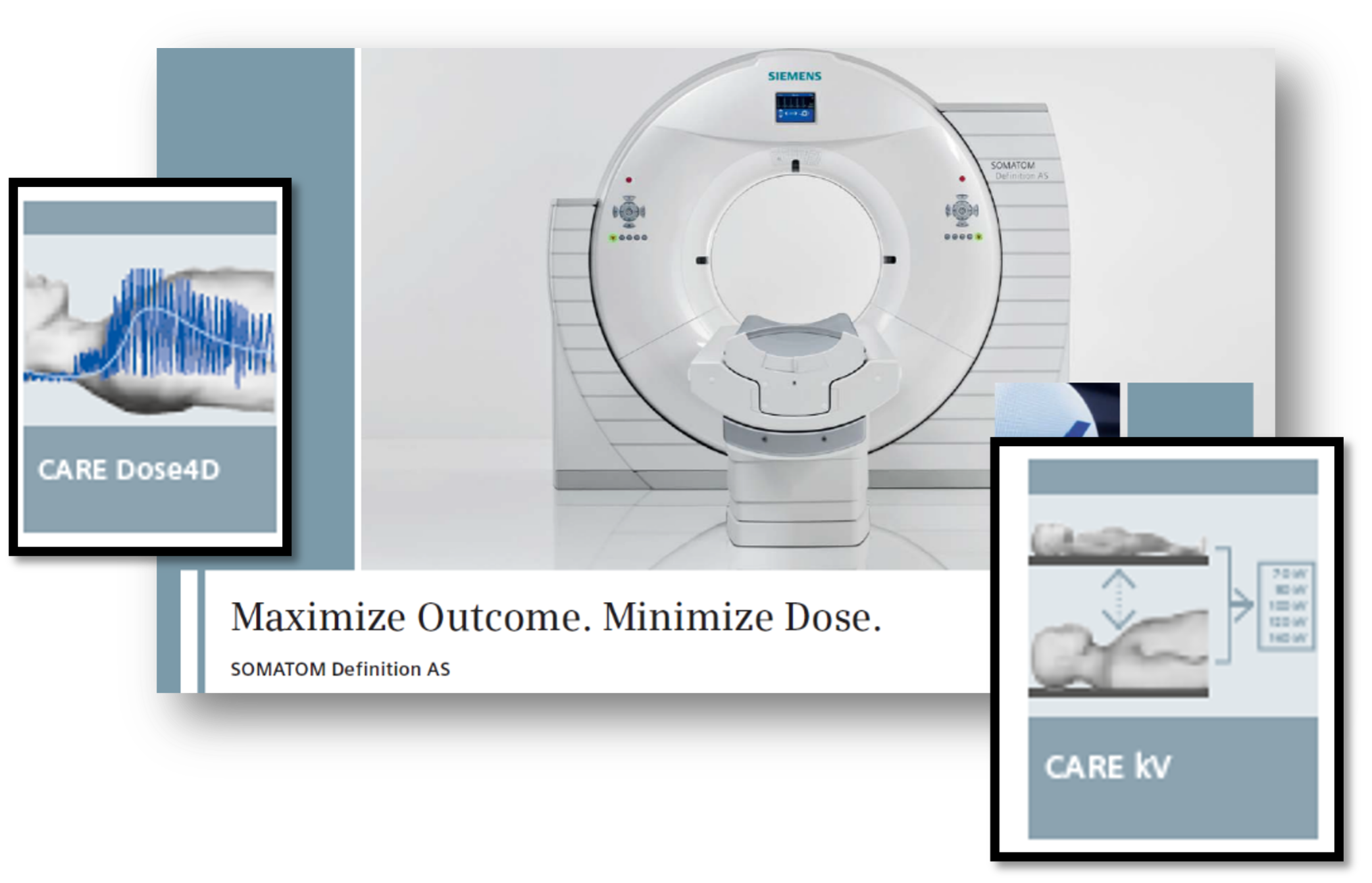
* Boone Hospital’s CT scanner: Siemen’s SOMATOM Definition AS 128 with CARE (Combined Applications to Reduce Exposure) software innovations for dose reduction
Patient Dose Monitoring
Boone Hospital Center utilizes a software program (“Dose Monitor”) to record and monitor patient radiation exposure. This program gives us the capability to document a patient’s radiation exposure for a single exam as well as maintain a cumulative record from prior exams. Radiation exposure data is routinely analyzed to set dose reference levels and evaluate our performance and clinical protocols.

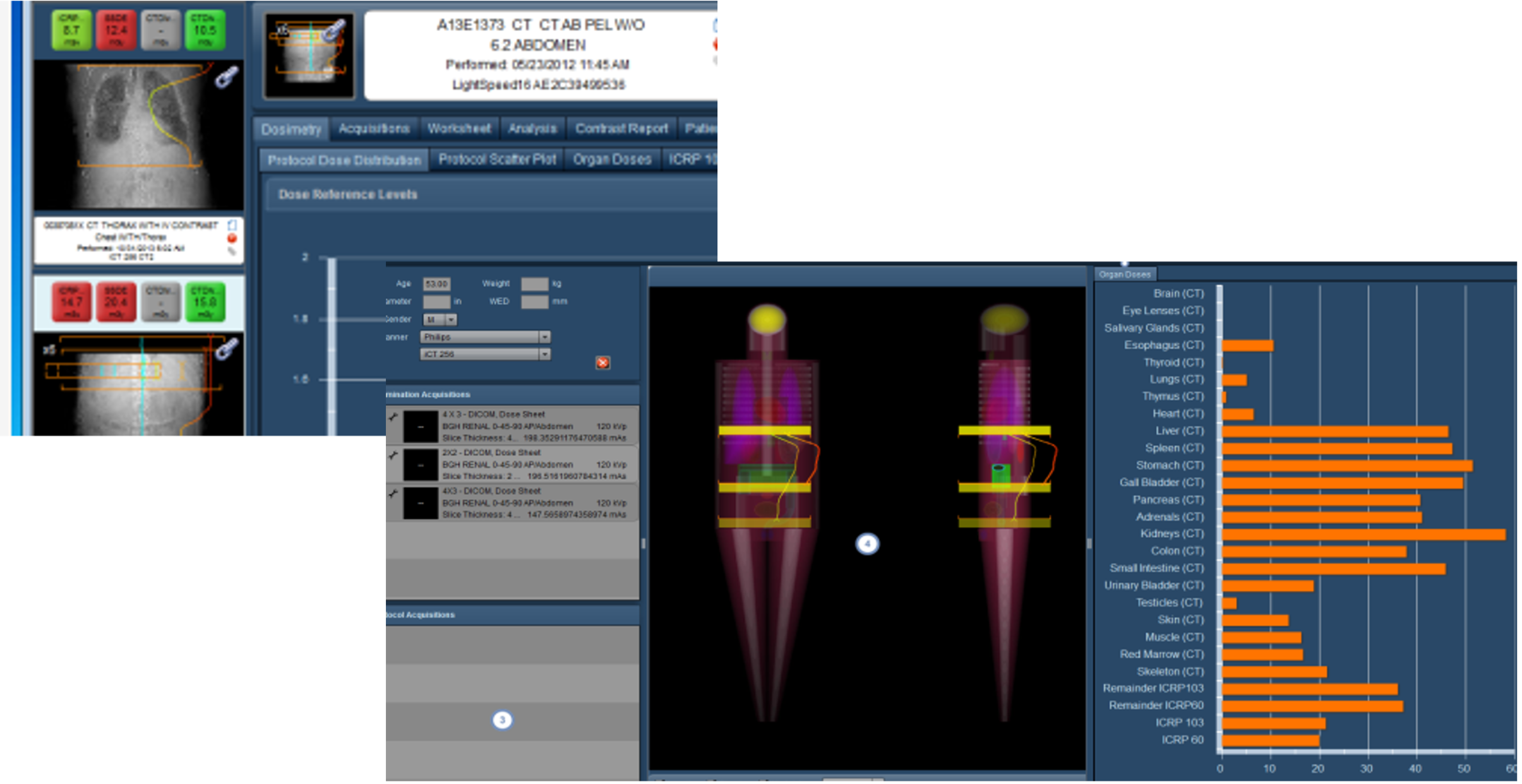
Personnel Expertise
Interpreting Radiologists: Radiologists at Boone Hospital Center are certified by the American Board of Radiology and are certified in various radiology subspecialties. Our six Radiologists have a combined 130 years of experience and perform and/or interpret more than 100,000 imaging procedures each year. Our Radiologists hold high standards for image quality and patient safety. They communicate with ordering physicians to eliminate unnecessary repeat scans and may suggest alternative imaging exams that do not use radiation, such as MRI or ultrasound, when appropriate.
Imaging Technologists: Limiting radiation exposure ultimately relies on the training and experience of the imaging personnel. You can rest assured that 100% of Boone Hospital imaging technologists are registered and maintain credentialing requirements set by their respective national boards. Boone Hospital also requires that technologists performing advanced diagnostic imaging pass specialized board exams and hold advanced certifications. All technologists participate in comprehensive annual radiation safety training and are dedicated to performing your exam right the first time- eliminating repeat imaging and unnecessary exposure.
Radiation Safety Officer: The Radiation Safety Officer at Boone Hospital has over 25 years of experience in the field of nuclear medicine and radiation safety. It is the responsibility of the RSO to perform periodic reviews of radiation safety practices and exam protocols to ensure patients and staff are exposed to as little radiation as possible.
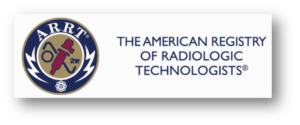
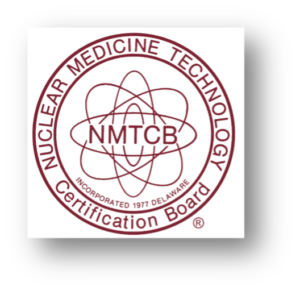
“Child Size” Pediatric Doses
It is not necessary to use adult-sized doses of radiation to obtain high quality images in children. We use low dose protocols in CT, Diagnostic Radiology and Nuclear Medicine to ensure radiation exposure to our pediatric patients is as low as possible. Imaging professionals at Boone Hospital abide by the guidelines of the Society for Pediatric Radiology and the “Image Gently” alliance. For more information about pediatric radiation safety, visit www.imagegently.org.
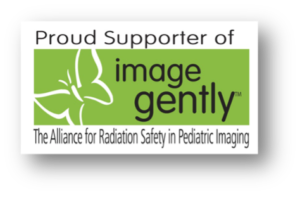
Evidence Based Practice
Like all of healthcare, radiology is much more complex than it was even a few years ago. Imaging professionals at Boone Hospital keep current on the latest advances in imaging techniques and technology. We also follow the latest evidence-based guidelines in order to provide you with the best images, improve your outcome and minimize your radiation dose.
Did you know that the use of lead shields during an x-ray or CT exam is no longer recommended? Lead shielding was introduced over 70 years ago- and became an ‘expected’ practice during medical and dental exams. Recently, prominent medical and scientific groups including the American Association of Physicists in Medicine, the American College of Radiology, and the Radiological Society of North America published research showing that:
- the levels of radiation used in modern X-ray exams is about one-twentieth of what is was in the 1950’s. Decades of data show that this level is so low that the risk of harm is very small or zero
- lead shielding may impair the quality of diagnostic tests by covering a body part that the doctor needs to see.
- modern X-ray machines are designed to automatically increase radiation if it detects objects that block X-rays from getting through. Therefore, patient shields can trick the system into increasing radiation
- covering reproductive organs and fetuses with a lead shield provides no added benefit for patient safety
As leaders in the health care community, Boone Hospital will remain at the forefront of change when that change improves the health and safety of our patients. The movement to discontinue fetal and gonadal shielding has been slow in gaining momentum because it involves changing the public’s perception of the risk of medical radiation. Patients who ‘expect’ to be shielded are surprised to learn that shielding can cause problems. Until the medical community, and public, are re-educated you will likely encounter inconsistencies in clinical practice. While being shielded at some facilities – but not at others- will create confusion and slow progress, you can trust that Boone Hospital will be promoting and fully endorse this new ‘best practice’ standard.
The next time you have an x-ray or CT at Boone, the technologist should inform you why we are discontinuing the use of fetal and gonadal shielding. However, if you would still feel more comfortable having a shield during your exam, we will provide one- as long as it will not interfere with the image quality.
How Can You Minimize Your Risk?
To help ensure appropriate use of diagnostic imaging, and to minimize your risk, you should:
- Have an open discussion with your physician. Find out about the risks and benefits associated with the recommended diagnostic imaging procedure. Ask :
- How will you use this exam to evaluate my condition or guide my treatment?
-
- Are there other exams that do not use radiation that are equally useful?
- Keep track of your medical imaging history. Make sure your physician has a record of your previous imaging tests. This record can be valuable for understanding your medical history and for managing your radiation history risk over time
- Select a top-quality imaging facility. Prior to scheduling, make sure the imaging center you choose has the gold seal documenting ACR accreditation. ACR Accreditation is recognized as the gold standard in medical imaging. ACR Accreditation signifies the facility provides the highest level of image quality and safety.
For additional information regarding medical imaging and radiation safety, visit:
